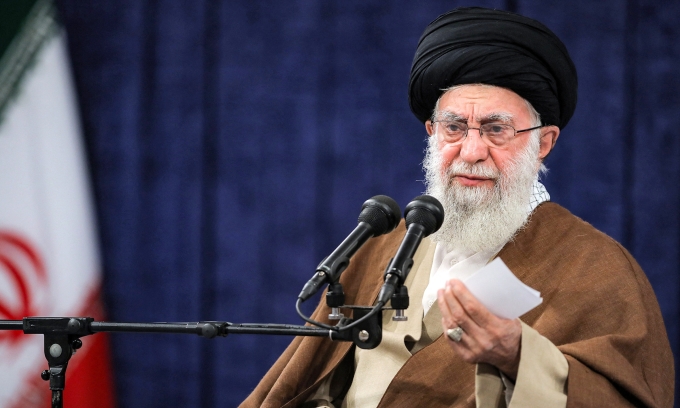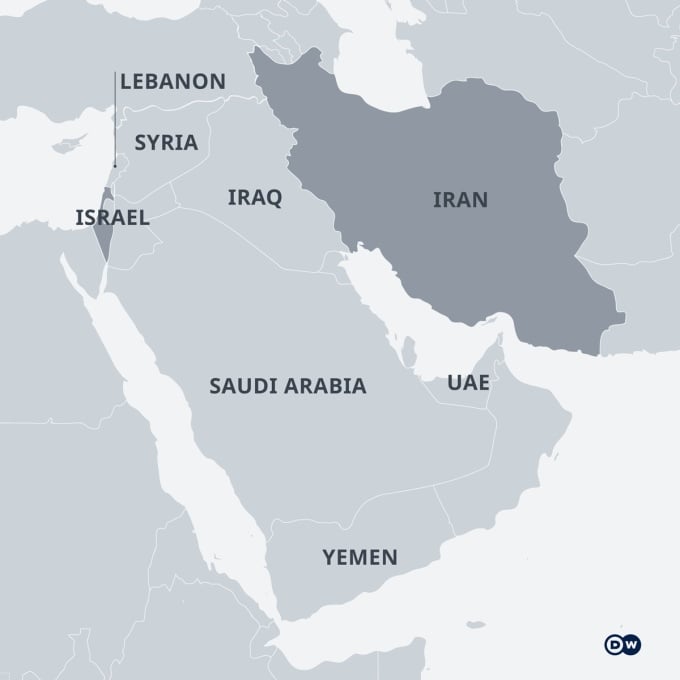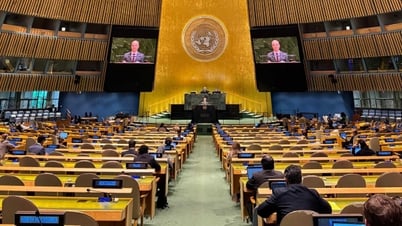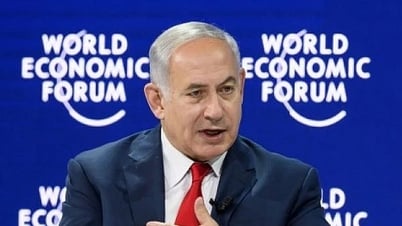Iran's leaders have always shown hostility towards Israel because they believe Tel Aviv "occupies Muslim land" and manipulates US policy in the Middle East.
Iran has emerged as one of the most vocal opponents of Israel's ground offensive in the Gaza Strip, accusing Tel Aviv of "war crimes" that have killed nearly 15,000 people in the enclave. Iran's Supreme Leader Ali Khamenei on November 19 even called on Muslim countries to cut ties and stop trade with Israel.
The Gaza conflict has sparked debate about why Iran's leaders have always been hostile to Israel, a country they have declared their "frenemy." Some experts and US officials have theorized that Iran wanted to disrupt efforts to normalize relations between Israel and Saudi Arabia, so it supported Hamas in carrying out the raid to stir up outrage in the Arab world .
However, Reuel Marc Gerecht, a fellow at the Foundation for Defense of Democracies in Washington, and Ray Takeyh, a fellow at the Council on Foreign Relations in New York, argue that this view fails to take into account the anti-Semitic sentiments expressed by Iran's leaders over decades.
Iranian clerics have long viewed Israel as an “illegitimate state” founded on an attempt to usurp Muslim holy lands. They call Israel a “settler-colonial state,” and believe that Jews have manipulated U.S. policy in the Middle East. Therefore, in Tehran’s view, Muslims have an obligation to fight Israel and global Jewry.

Iran's Supreme Leader Ayatollah Ali Khamenei in Tehran on October 25. Photo: AFP
Supreme Leader Ruhollah Khomeini was the one who established this ideology for Iranian Muslims. In his book The Islamic Government , he wrote that "from the very beginning, the historical struggle of Islam had to fight the Jews, because they were the first to spread anti-Islamic propaganda." He described the Jews as distorters of the Koran, financial speculators, and agents of the West.
Mr Khomeini's anti-Semitic views were taken up by former president Akbar Hashemi Rafsanjani and current supreme leader Ali Khamenei. Mr Rafsanjani published the book Israel and the Beloved Jerusalem , declaring that opposing the Jewish state was a sacred duty of "every Muslim and anyone who believes in God".
According to Gerecht and Takeyh, Iran has been running a propaganda machine hostile to Israel for the past four decades. Iran’s state-run news agencies regularly publish a book called The Secret Letters of the Elders of Zion and other anti-Semitic articles. Iranian television also airs numerous anti-Semitic documentaries.
Iran’s leaders, including Khamenei, regularly meet with Western Holocaust deniers at Iran-sponsored conferences in Tehran. A Holocaust cartoon contest launched by Khamenei in 2006 awarded prizes for anti-Semitic works.
Iran’s stance on the Middle East peace process has always been more extreme than most Arab countries in the region. Tehran has supported and armed militant groups such as Hamas in Gaza, Islamic Jihad in the West Bank and Hezbollah in Lebanon.
Khamenei, who frequently refers to Israel as a “tumor that needs to be removed” from the Muslim world, stressed that Tel Aviv “has suffered an irreparable defeat both militarily and intelligence-wise,” referring to the Hamas attack on October 7.
Shireen Hunter, emeritus fellow at the Center for Islamic and Christian Learning at Georgetown University in the US, said that in Iran's worldview, Israel is seen as a colonial outpost of the West and Zionism is a version of imperialism.
Before the Islamic Revolution, Iran had a fairly close relationship with Israel. It was the second Muslim-majority country to recognize Israel in 1950, after Türkiye. During this period, Tehran and Tel Aviv became close, based on close cooperation in military, technological, agricultural and oil issues. Iran then saw Israel as a gateway to receiving major US support and funding.
By the mid-1970s, Iran was no longer seen as a proxy for US interests in the Middle East. With rising oil revenues, Iran’s then-leader, Shah Mohammad Reza Pahlavi, adopted a more independent and proactive policy on regional issues and strengthened relations with Arab countries.

Paramilitary forces carry a coffin symbolizing the end of Israel and the United States at a military parade in Tehran, Iran on November 24. Photo: Zuma Press
In 1975, the Pahlavi Shah signed an agreement with Iraq, in which Baghdad agreed to resolve the Shatt al-Arab waterway dispute in Iran's favor in exchange for Tehran ceasing its support for Kurds fighting the Iraqi government.
In addition, in the mid-1970s, Shah Pahlavi wanted to acquire civilian nuclear capabilities to end Israel's nuclear monopoly in the Middle East. With a vibrant economy and large military capabilities, Iran emerged as an important trade and security partner of the United States in the Persian Gulf, and a potential rival of Israel.
However, many see America's displeasure with the Shah for supporting rising oil prices after the 1973 Arab-Israeli war as being orchestrated by Tel Aviv.
Iran's value to Israel and the United States declined after the 1979 Islamic Revolution. However, Tel Aviv convinced the then-US President Ronald Reagan administration to secretly sell weapons to Iran during the Iran-Iraq war in the 1980s, seeing Baghdad as a greater danger.
By 1987, with both Iraq and Iran weakened by the war, Israel changed its strategy, seeking to forge a peace agreement with Egypt while maintaining its isolation from Iran.
Israel opposed any positive Western response to signs of moderation from Iran during the presidencies of Hashemi Rafsanjani, Mohammad Khatami and then Hassan Rouhani. The Jewish state promoted the US “dual containment” strategy of Iran and Iraq in the 1990s, and lobbied for increased US sanctions against Iran.
As the United States prepared to launch an attack on Iraq in 2003, accusing Baghdad of possessing weapons of mass destruction, some Israeli leaders sought to persuade the White House to take similar military action against Iran, accusing Tehran of also seeking to develop nuclear weapons.

Location between Israel and countries in the region. Graphics: DW
Tel Aviv is also competing with Iran for influence in former Soviet states, especially Azerbaijan, and has formed an alliance with Baku against Tehran. Meanwhile, Iran is expanding its influence in countries near Israel, especially Syria.
Israel has in recent years promoted normalization of relations with a series of Middle Eastern and African countries such as Bahrain, the United Arab Emirates (UAE), Morocco, Sudan and possibly Saudi Arabia. This may make Iran feel that the diplomatic balance in the Middle East is not tilting in its favor, according to observers.
Dr. Ali Bilgic, an expert on international relations and security at Loughborough University, UK, said Iran could take advantage of Hamas' attack on Israel to regain its "halo", thereby affirming the country's position as "the leader of the Muslim world".
As relations between Israel and Iran continue to be strained, expert Shireen Hunter said that "a positive outcome to resolve the hostilities between the two sides is unlikely to happen soon".
Thanh Tam (According to WSJ, Stimson )
Source link















































































































Comment (0)